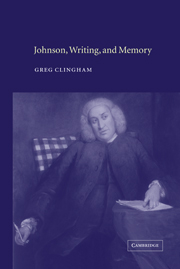Book contents
- Frontmatter
- Contents
- Acknowledgments
- List of abbreviations
- Introduction: Johnson and authority
- 1 Johnson and memory
- 2 Johnson and nature
- 3 Law, narrative, and memory
- 4 Narrative, history, and memory in the Lives of the Poets
- 5 Translation and memory in the Lives of the Poets
- 6 Historiographical implications
- Notes
- Bibliography
- Index
4 - Narrative, history, and memory in the Lives of the Poets
Published online by Cambridge University Press: 22 September 2009
- Frontmatter
- Contents
- Acknowledgments
- List of abbreviations
- Introduction: Johnson and authority
- 1 Johnson and memory
- 2 Johnson and nature
- 3 Law, narrative, and memory
- 4 Narrative, history, and memory in the Lives of the Poets
- 5 Translation and memory in the Lives of the Poets
- 6 Historiographical implications
- Notes
- Bibliography
- Index
Summary
The notion that people more often need to be reminded than informed is central to Johnson's thinking about human experience. Anticipating the basic recollective structure of psychoanalysis, in which the past through “repetition” seeks re-emplotment in a newly imagined narrative, Johnson's idea speaks to the relationships among memory, knowledge, writing, and character which inform the structure and experiential content of the Lives of the Poets. These are relationships which make for the constitutive and “redemptive” functions of biographical memory. Such theoretical terms have long been used to describe Boswell's biographical writing, and, while the fictive nature of biographical writing – most obviously, the use of tropes and figurative language in recording a life – has been widely accepted in other areas of literary studies, we have insisted on seeing Johnson as wedded to a theory of positivistic verisimilitude. Oddly, we have not registered Johnson's insistence on the imaginativeness of life writing. In “Rambler” 60 he notes that, like high forms of literature, biography succeeds in proportion to its capacity to draw on and appeal to common human experiences, for “[a]ll joy or sorrow for the happiness or calamities of others is produced by an act of imagination, that realises the event however fictitious, or approximates it however remote … Our passions are therefore more strongly moved, in proportion as we can more readily adopt the pains and the pleasures proposed to our minds” (III, 318–19).
The sympathetic experience described here is no different in kind from that of poetry or fiction.
- Type
- Chapter
- Information
- Johnson, Writing, and Memory , pp. 89 - 121Publisher: Cambridge University PressPrint publication year: 2002



